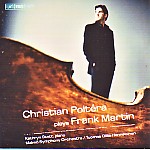I’ve never understood why Frank Martin’s Cello Concerto isn’t a regular visitor on the concert circuit, but then I’ve never understood why Martin’s music in general isn’t more often played. It’s accessible in a way defined by modern neo-classicism with a touch of late Romanticism, flirtation with advanced techniques barely noticeable to the listener, wonderful, Gallic textures–and it’s invariably gratefully written for instrumentalists. All those attributes are evident in this excellent new recording featuring one of Europe’s rising young cellists, Christian Poltéra.
The Concerto is a multi-faceted work whose opening movement begins and ends with a slow, melancholic cello melody that sandwiches a moderately paced but lively allegro. The Adagietto is nicely sung by Poltéra and the wind-led orchestra, while the Vivace last movement is more openly virtuosic. Here we can admire the cellist’s ease in the highest register and the fluency of his pizzicato passages. Jazz influences are felt in the slithering figures in the solo part, the playful piano rhythms of the movement’s start, and the important presence of the saxophone. But even within that movement’s energetic context Martin finds balance through lyrical cello episodes.
Poltéra is ably partnered in the Concerto by the Malmö Symphony, led by Tuomas Ollila-Hannikainen, who together render Martin’s transparent orchestration with precision. The sound tends to favor the solo instrument, but not to an extent that compromises your enjoyment. This version likely will supplant or complement an old Cascavelle CD (in monophonic sound) of a live 1967 performance of the Concerto by Pierre Fournier with Ernest Ansermet, made just months after the cellist gave the premiere. Fournier plays the work with slightly more intensity, brighter tone, and more flowing tempos than Poltéra’s equally valid alternative view.
The Concerto’s disc partners are substantial: Martin’s 1949 Ballade for Cello and Piano, and his 1948 Eight Preludes. The Ballade is a free-form work that begins and ends on a mournful note, moving effortlessly among episodes of varied character, from rhythmically incisive drama to poetic lyricism. Poltéra and his piano partner, Kathryn Stott, are superb in their handling of Martin’s tricky rhythms and in their fusion of Romantic emotion and neo-classic rigor. Again, there’s nothing but admiration for Poltéra’s steady, balanced tone and the involvement of his playing.
The Preludes feature Stott in a work originally written for Dinu Lipatti. She plays with beauty of tone, plenty of energy in the faster pieces, and great depth of feeling in the introspective Lento, which takes almost a third of the work’s 23-plus minutes. As expected from BIS, the sound is first-rate; the overtones in the chordal opening of the Preludes linger in the air and Stott’s pedaling nuances are easily heard. Poltéra’s cello is rendered with tonal exactitude, and the accompaniments in the cello works are well balanced. Highly recommended! [5/29/2008]
































